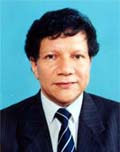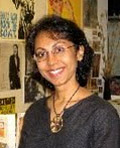|
Correspondence |
|
|
The Secretariat
ICLLIC 2010
The English Language Studies Section
School of Humanities
Universiti Sains Malaysia,
11800 Penang. Malaysia.
Tel: 604-6533888 ext. 3377/3336
Fax: 604-6563707
Email: icllic2010@usm.my
Contact persons
Assoc. Prof. Shakila Abdul Manan
04-6533888 ext. 3377
Dr. Raja Rozina Raja Suleiman
04-6533888 ext 3336 |
|
|
Welcome to ICLLIC 2010
The first decade of the new mill
The following are the keynote and
plenary speakers of the conference:
|
Keynote Speaker |
 |
|
Professor Dato’ Dr Ibrahim Ahmad Bajunid
INTI University College, Malaysia |
Abstract
Making Sense of a Life with Language[s],
Culture and Literature in a Globalised Age of Unreason: Fathoming the
Imagination and Futures Perspectives of the Noble Savages and the
Digital Natives
The paper revisits the idea of how the
complex web of culture, literature , language[s] and media, mirrors the
multidimensional aspects of Life, and how Life itself provides the
substance and content for the various forms of human expressions and
communication. Within the context of constructed realities, the paper
critically discusses the anatomy of sociological facts, and, cultural,
as well as individual fiction transmitted to societal members. The
metaphor of the learning, education and socialization of the Noble
Savage and Digital Native [as the anthropological ‘other’] is
used to examine the life of intellect, imagination and arrival of
meanings, reconstructed by Man within particular societies
across/through the epochs of human history. A Framework of Knowledge
which encompasses Revealed Knowledge, Empirical Knowledge, Forbidden
Knowledge and Imaginative Knowledge applied and managed by Man in
creative and innovative ways in the March of civilization is presented.
The way in which the contents of the Knowledge are disseminated through
formal, non formal and informal learning within specific contexts and
time span, in mainstream and subcultures is analysed. The paper
essentially questions how individuals know what they know, and, not know
what they do not know as they journey through life with the tools of a
particular language [or with several languages] in any particular
culture. In the context of Globalization, Liberalization and
Internationalization, the paper also raises the question as to whose
languages, literatures, cultures, an individual is to learn and own,
and, how such decisions affect behaviours and identities. The roles of
international and national languages in the education of a person are
critically analyzed in terms of individual, family and societal
identities, in the context of the overt and covert agenda of linguistic
and ethic communities. The paper then explores human potentialities and
societal decision-making regarding the content and procedural knowledge
worth knowing, and, the tools as well as strategies used to transmit
such knowledge to individuals and communities. In conclusion, the paper
proposes how individuals can enhance personal development optimally by
designing a personalized, customized, and individualized curriculum of
lifelong, life wide and perpetual learning as "a way of being,"
through mindfully and consciously mastering languages, cultures, and
relevant knowledge of the arts, humanities, social sciences and
sciences.
Biodata
Professor Dato’ Dr. Ibrahim Ahmad Bajunid is
Deputy President / Deputy Vice Chancellor INTI-UC Laureate International
Universities and Professor of Management, Education and the Social
Sciences. Dr. Ibrahim is the First Director of the Regional Center for
Educational Planning (UNESCO-RCEP), Al Sharjah, United Arab Emirates.
Dr. Ibrahim Ahmad Bajunid was Professor of Management, Leadership and
Policy Studies and the Founding Dean, Faculty of Humanities and Social
Sciences at University Tun Abdul Razak (UNITAR) for seven years before
taking the post of Director, RCEP. He is the former Director of
Institut Aminuddin Baki (IAB) - The National Institute of Educational
Management and Leadership. He was a member of the Task Force that
established Institute Aminuddin Baki in 1979. For more than two and a
half decades he has been the key figure in the Field of Educational
Management and Leadership in Malaysia. He is Editor and Editorial
Advisor for several educational journals, locally and internationally.
He has presented keynote addresses at various national and international
conferences in Malaysia and abroad. Dr. Ibrahim Bajunid exercises many
leadership roles and has provided services as consultant in
policy-making governmental Committees, private sector and
Non-Governmental Organizations (NGOs). He was President of the Senior
Educators’ Association, Fellow of the Council of Education Management in
Commonwealth Countries, Distinguished Fellow of the Institute of
Strategic and International Studies (ISIS) Malaysia, Fellow Emeritus of
the National Institute of Educational Management and Leadership (IAB),
Fellow of the National Research Institute on Youth, Senior Fellow of the
Malaysian Social Institute, Consultant Fellow of the International
Institute of Educational Planning (IIEP). Member of the Advisory Board
of Asia Pacific Centre for Leadership and Change (APCLC), Hong Kong
Institute of Education, and, Honorary Life Member of the Malaysian
Association for Music Education (MAME). He was actively involved as a
Trade Union leader and is currently leading professional associations,
including, as President of the Malaysian Institute of Human Resource
Management (MIHRM), Malaysian Association for Education (MAE), and, the
Malaysian Educational Management and Leadership Association, and Board
Member and President Elect of the Asia–Pacific Educational Research
Association (APERA). He has been a consultant in Thailand, United Arab
Emirates, Botswana, and Cambodia and had the opportunity of contributing
in the activities of UNESCO, UNDP, ASEAN Council of Teachers (ACT), and
Education International (EI). He was a regular columnist in the New
Straits/Sunday Times with a weekly column every Sunday, entitled,
“As I Wonder”. He was the National Advisor/Consultant for Asia–Europe
Initiative on Lifelong Learning in Malaysia, and, is currently engaged
in several research projects and is supervising several Masters and
Doctoral scholars. Dr. Ibrahim is in the Academic Advisory Boards in
several national universities. He has written over five hundred articles
and academic papers covering significant issues in national development
relating to education, social and intellectual capital creation, the
strengthening of families and communities, and the enhancement of human
potentialities. He has been a Panelist in many public media fora
discussing issues on education, human resources development, and
societal change.
His latest publication is Bajunid, I. A
(2008) (ed.). Malaysia - From Traditional to Smart Schools -
The Malaysian Educational Odyssey. Kuala Lumpur:
Oxford Fajar Sdn. Bhd. Dr. Ibrahim Bajunid has also been recognized by
the Malaysian Historical Society and the Malaysian Library Association
for his contributions to the promotion of historical literacy and
knowledge culture respectively. He has been recognized for contributions
to the Teachers Trade Union Movement by the National Union of the
Teaching Profession (NUTP), as well as by the Malaysian Association of
Music Educators (MAME) for his support of their works. He is Member of
the National Committee on the Study, Review and Reform of Higher
Education in Malaysia. He is Adjunct/Visiting Professor at several
universities. He has exercised several key roles pertaining to the
National Quality Agenda in Education in the Educational Quality Journey
over the last two and a half decades particularly in initiating
Training Programmes, in Quality Control Circles, Quality Control,
Quality Assurance, and in Total Quality Management in Education. He has
been involved in the National Accreditation Board and Malaysian
Qualifications Agency Processes both as practitioner and as
member of the wider policy making community [in the education
bureaucracy, in private sector education leadership and as contributor
from the Non Governmental Organization Stakeholder – the Professional
Association Sector]
|
|
|
|
|
|
Plenary Speaker |
 |
|
Associate Professor Dr. Michelle M. Lazar
National University of Singapore |
|
Abstract
Gender and Power: Challenges to Critique in Late Modernity
Since the 1990s, scholars
have argued for the importance of Critical Language Awareness (CLA) in
language pedagogy (Fairclough 1992). Drawing impetus from studies in
Critical Discourse Analysis (CDA), CLA with its conscious attention given to
the social aspects of language use, and especially relationships between
language and power, is considered to play a significant role in enabling
learners to participate effectively in democratic citizenship within and
beyond the classroom.
Taking as my focus the study
of gender and power in CDA, I shall discuss its usefulness for CLA in
offering insights on how asymmetrical relations of power are enacted and
sustained through common-sense assumptions underlying gender
representations. The main part of my presentation, however, is devoted to
discussing some challenges to critique, presented by societies today in
which textual representations of gender have become ever more complex. In
particular, I shall examine textual media representations of feminine power
and empowerment that are becoming rather commonplace, and increasingly
embraced by young women. My aim is to consider the relevance of textual
critique at a time that is ostensibly post-critique, and the implications
that has for the practice of CLA.
Biodata
Michelle M. Lazar is Associate Professor in the Department of English
Language and Literature, Assistant Dean of the Faculty of Arts and Social
Sciences, and the Academic Convenor of the Gender Studies Minor Programme at
the National University of Singapore. She researches and teaches in the
areas of critical discourse analysis, feminist and gender studies, media and
political discourse, and multimodal discourse analysis. She has published
numerous journal articles and book chapters in these areas, and is the
editor of Feminist Critical Discourse Analysis: Gender, Power and
Ideology in Discourse (Palgrave 2005/2007). She currently serves on the
editorial boards of seven international journals.
Web Link
Weblink:
http://profile.nus.edu.sg/fass/ellmml/
|
|
Plenary Speaker |
 |
|
Associate Professor Dr Kirpal
Singh
Singapore Management
University
|
AbstractNegotiating
Conflict: The Role of Literature in Plural Nations.
9/11 changed the world. It changed the way we look at each other. From
that date began a new sense of anxiety, worry and suspicion. Having
travelled extensively since I am convinced that 9/11 marks a paradigm
shift in the way/s we relate to each other. And this is critical for all
of us. But it is especially crucial for those of us who live in
proximity to others with different faiths and therefore very different
perspectives on life and its values. I believe that if we do not handle
this difference sensitively we will see the beginning of a conflict
worldwide which might prove catastrophic and perhaps even apocalyptic.
I believe LITERATURE provides a very valuable platform for us to educate
ourselves in terms of handling this potential conflict. I am convinced
that if we pay heed to what writers tell us we might still be able to
realise some measure of understanding across religious cultures. But we
need to be honest and open. We need all mature individuals to be on
board. The end, as I see it, if we do not negotiate carefully around
this vast potential conflict, is literally very near. It IS now or
never.
Biodata
Dr Kirpal Singh is currently the director of the Wee Kim Wee Centre at
the singapore Management University, where he has been since its
inception in 2000. Prior to being invited to join the founding faculty
of this exciting new university, Kirpal taught, for many years, at the
NUS(National University of Singapore) and at the NTU(Nanyang
Technological University). Kirpal is an internationally known writer and
scholar and has been invited to give Keynotes at some of the world's
best universities, including Yale, Columbia, MIT, Cambridge, Oxford,
Georgetown, College of William & Mary, UPenn, NYU, Warwick, Barcelona,
Bonn, Muenster, UCLA, Madrid, Sydney, Melbourne, Delhi. In recent years
Kirpal has become internationally recognised as a Creativity
guru(follwing the very successful publication of his book THINKING HATS
& COLOURED TURBANS: Creativity Across Cultures, 2004)as well as a
futurist, having governments and MNCs invite him to share his visions of
the future with them. He is now completing a book on Leadership.
|
|
|
|
|
News & Updates |
| |
Untitled Document
|
| |
|
Download Area |
|
1. Brochure
2. Schedule
3. Map/Location
4. Extended Abstract
Guideline
5. Registration
Form
6. Room
Reservation Form - Eastin Hotel

 |
|
